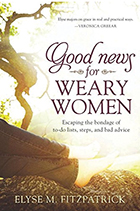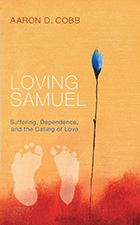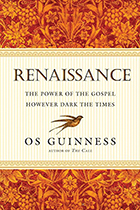
Good News for Weary Women: Escaping the Bondage of To-Do Lists, Steps, and Bad Advice
Elyse M. Fitzpatrick (Resurgence)
One year ago, Fitzpatrick, a popular author and Bible teacher, took to her Facebook page with a provocative question: What, she asked, is some of the worst advice routinely dumped upon churchgoing women? Hundreds of replies streamed in from women fazed by pressures to raise picture-perfect children, maintain immaculate homes, and keep their bodies impossibly slender and toned. “I knew that women felt burdened and wearied,” writes Fitzpatrick, “but I didn’t have any idea how much frustration, anger, angst, and despair was simmering just beneath the surface of so many hearts.” Good News for Weary Women offers the finished work of Jesus Christ as an antidote to the burden of unrealistic expectations.

Loving Samuel: Suffering, Dependence, and the Calling of Love
Aaron D. Cobb (Cascade Books)
Samuel, Cobb’s son, died five hours after his birth, a casualty of the chromosomal defect known as Trisomy 18; the diagnosis had come in utero months earlier. Cobb, a philosopher specializing in medical ethics, has written a series of brief meditations on the challenge of welcoming Samuel into the world beneath a shadow of encroaching tragedy. “Those brief hours with him were some of the most important in my life,” he writes. “They were at once peaceful, sad, and significant. Holding Samuel was an unexpected gift, a tender touch of mercy at the end of a difficult journey.”

Renaissance: The Power of the Gospel However Dark the Times
Os Guinness (InterVarsity Press)
These days, reasons for despairing over the future of Western Christianity—and the societies it has enlivened—aren’t hard to find. Guinness, the renowned cultural commentator, is well-versed in the many reasons for pessimism regarding the church’s fate. Surveying a range of internal and external threats, Guinness asks a pointed question in his latest book: “Can the Christian church in the advanced modern world be renewed and restored even now and be sufficiently changed to have a hope of again changing the world through the power of the gospel? Or is all such talk merely whistling in the dark—pointless, naïve, and irresponsible?” Renaissance balances realism about our precarious cultural situation with a hope grounded in the continuing sovereignty of God and his promises.












